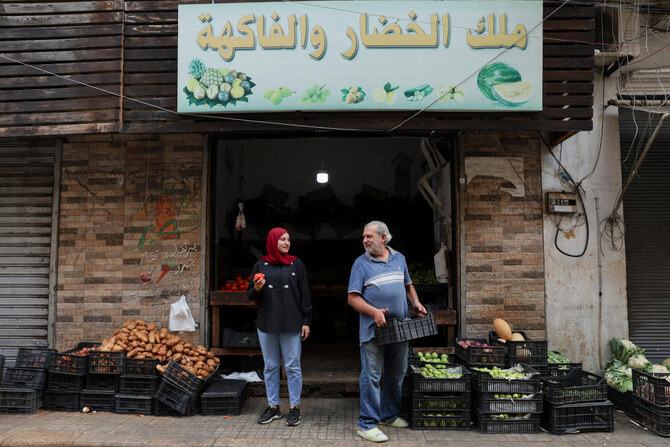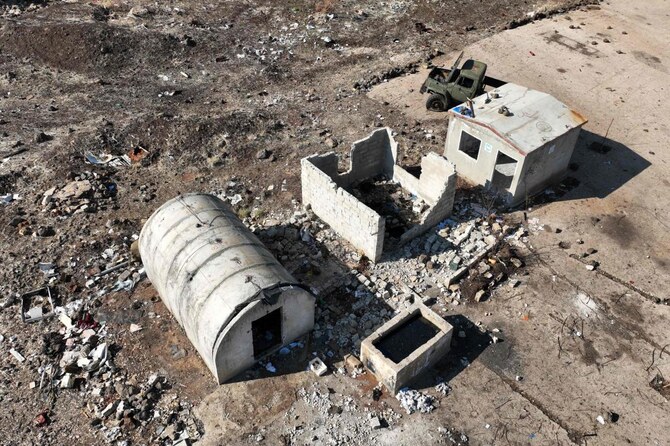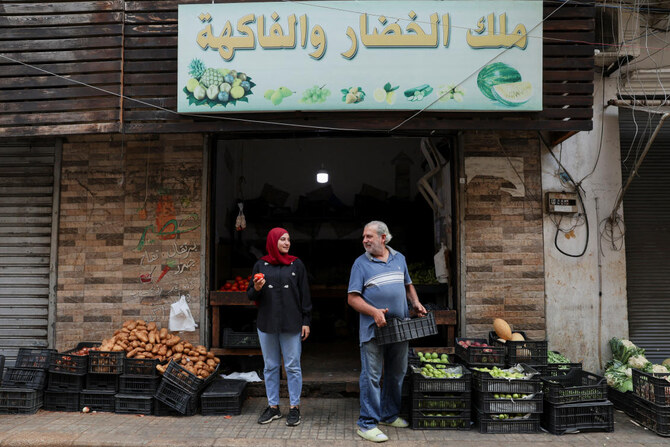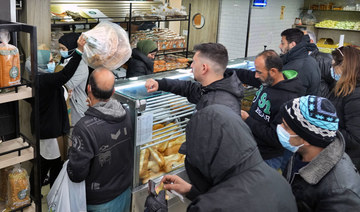BEIRUT: Shopkeeper Alaa Fakih lies awake at night scared that another catastrophe could strike Lebanon. Like many she is traumatized by the past — from the 1975-1990 civil war to a devastating Beirut port blast in 2020 and an enduring economic collapse — and fearful of the future.
“I shouldn’t be thinking about all these things — I’m thinking how to continue my daughter’s education and if, for example, I was walking and God forbids, an explosion happens,” said Fakih, 33, whose heart beats rapidly at night as she shivers.
“How to walk and not have an explosion. All these have a negative effect on my psychological well-being.” People are now most anxious about the prospect of another full blown conflict between Lebanon’s armed group Hezbollah and Israel, who have been engaged in border warfare since the Gaza war erupted in October. Lebanon took years to rebuild from a 2006 war between the arch-foes which killed 1,200 people in Lebanon, mostly civilians, and 158 Israelis, most of them soldiers.
Decades of corruption and mismanagement by ruling politicians led the financial system to collapse in 2019, wiping out savings, demolishing the currency and fueling poverty.
The following year, Beirut was shattered by a huge chemicals explosion at the port that killed at least 220 people and was so powerful it was felt 250 km (155 miles) away in Cyprus and sent a mushroom cloud over the Lebanese capital. Political pressure has derailed an investigation that sought to prosecute powerful people over the explosion.
“One can cry from the slightest things, your tears come down,” said Fakih.
COPING MECHANISMS
Psychoanalyst Alyne Husseini Assaf said Lebanese have struggled to process the many layers of suffering. Some hide away their feelings. Others live in denial.
“There’s a defense mechanism of escaping, mostly with alcohol or drugs. There’s also a defense mechanism where the person escapes in psychological and physical symptoms, sits in bed and does not want to do anything anymore,” she said.
Once called the Switzerland of the Middle East, Lebanon descended into a brutal multi-sided civil war in 1975.
Reminders of the war are not hard to find, including bullet-riddled buildings in an area once known as the Green Line that split Beirut into Christian East and mainly Muslim West.
Sectarian tensions and memories of war linger on.
“There is a psychological legacy passed on from a generation to the next and it stays alive if the person does not work on themselves on a psychological level,” said Assaf.
All it takes is a sonic boom over Beirut to trigger panic attacks.
Manal Syriani, the mother of Eidan, 4, is typical. Her trauma is triggered by memories of the port explosion.
“There’s no follow up, there’s no justice, no one is telling you what’s going on,” said Syriani, who is in the hospitality business.
“There is now a person relying on me so how will I make this person feel safe? I mean, anything could happen. He could be playing outside and a shell falls, that’s it.”
She has sought relief from her thoughts at a church.
“It’s this calmness, this is what I seek, this is what makes me... that gives you fuel to keep going, to repeat the same cycles, to go through the same cycles again.”
Lebanese already haunted by past traumas fear more catastrophes to come
https://arab.news/jx9rq
Lebanese already haunted by past traumas fear more catastrophes to come

- People are now most anxious about the prospect of another full blown conflict between Hezbollah and Israel
- Lebanon took years to rebuild from a 2006 war between the arch-foes which killed 1,200 people in Lebanon
Palestinian population in Gaza Strip decreased by 6% in 2024 during Israeli war

- 5.5m Palestinians reside in West Bank, East Jerusalem, Gaza Strip
- 65% of them are under 30, only 4% above 65
- Nearly 100,000 Palestinians have fled Gaza Strip since October 2023
- Palestinian Central Bureau of Statistics confirms deaths of 45,484 individuals in the Israeli war on Gaza, as of December 2024
LONDON: The population of Palestinians in the Gaza Strip decreased by 6 percent in 2024, while the total number of Palestinians in the Occupied Territories, inside Israel, and globally reached almost 15 million.
The Palestinian Central Bureau of Statistics’ 2024 consensus published on Sunday reported that the Gaza Strip’s population decreased by 6 percent in 2024, resulting in a loss of nearly 160,000 Palestinians, bringing the total population to 2.1 million.
The report confirmed the deaths of 45,484 individuals during the Israeli war on the Gaza Strip, as of December 2024.
The casualties included 17,581 children, 12,048 women, and 11,000 individuals who were missing and believed to be dead under the rubble.
Additionally, 108,090 people were injured, and nearly 100,000 Palestinians have fled the coastal enclave since the Israeli military aggression began in October 2023.
Palestinian President Mahmoud Abbas said the figures were “terrifying,” and showed the extent of the Israeli occupation’s “brutality and its bloody massacres against our people,” the WAFA News Agency reported.
The total number of Palestinians reached 14.9 million in 2024, of which, according to the Bureau of Statistics, 7.3 million lived between the Jordan River and the Mediterranean Sea.
Of these, 5.5 million resided in the West Bank, East Jerusalem, and Gaza, with 65 percent being under 30 and only 4 percent above 65.
About 3.4 million people lived in the occupied West Bank and East Jerusalem, 2.1 million in the Gaza Strip, while 1.8 million were Palestinian citizens of Israel.
Around 6.4 million Palestinians resided across various Arab countries, including Jordan, Syria, Lebanon, the UAE, Egypt, and Saudi Arabia.
The remaining 1.2 million Palestinians belonged to the diaspora in Western countries, including Europe and North America.
Israel kills member of Palestinian security forces

- The Palestinian security services identified Rabaiya as a first lieutenant in its Preventive Security force, saying he was killed while “performing his national duty”
JERUSALEM: Israeli forces killed a member of the Palestinian security services in the occupied West Bank whom they accused of being a militant. Tearful Palestinians on Sunday meanwhile laid to rest six people killed in Israeli strikes in the Gaza Strip the day before, including a teenager.
Israel’s paramilitary Border Police said they carried out an operation in the West Bank village of Meithaloun to arrest Hassan Rabaiya, describing him as a wanted militant.
They said he was killed in a shootout while trying to escape, and that the troops found a shotgun, weapons parts and around $26,000 in cash inside his home.
Meithaloun is near the northern West Bank city of Jenin, an epicenter of Israeli-Palestinian violence in recent years.
The Palestinian security services identified Rabaiya as a first lieutenant in its Preventive Security force, saying he was killed while “performing his national duty.”
The Palestinian Authority has been waging a rare crackdown on militants in Jenin in recent weeks, angering many Palestinians.
The internationally recognized Palestinian Authority exercises limited autonomy in parts of the Israeli-occupied West Bank and cooperates with Israel on security matters. But Israel has long accused it of inciting violence and turning a blind eye to militants.
Meanwhile, Palestinians in Gaza held funeral prayers outside a hospital after six people were killed in two Israeli strikes the night before.
The mother and grandmother of the 15-year-old who was killed peeled back the white funeral shroud and kissed his cheeks as they sobbed. A few dozen people then gathered for prayers outside Al-Aqsa Martyrs Hospital in the central town of Deir Al-Balah.
Hezbollah leader Nasrallah was killed last year inside war operations room, aide says

- Nasrallah “used to lead the battle and war from this location,” Hezbollah official Wafiq Safa told news conference near the site where Nasrallah was killed
BEIRUT: Hezbollah leader Hassan Nasrallah was killed in an Israeli airstrike last year while inside the group’s war operations room, according to new details Sunday disclosed by a senior Hezbollah official.
A series of Israeli airstrikes flattened several buildings in Beirut’s southern suburbs on Sept. 27, 2024, killing Nasrallah. The Lebanese Health Ministry said six people died. According to news reports, Nasrallah and other senior officials were meeting underground.
The assassination of Nasrallah, who had led Hezbollah for 32 years, turned months of low-level strikes between Israel and the militants into all-out war that battered much of southern and eastern Lebanon for two months until a US-brokered ceasefire took effect Nov. 27.
“His Eminence (Hassan Nasrallah) used to lead the battle and war from this location,” top Hezbollah security official Wafiq Safa told a news conference Sunday near the site where Nasrallah was killed. He said Nasrallah died in the war operations room. He did not offer other details.
Lebanese media had reported that Safa was a target of Israeli airstrikes in central Beirut before the ceasefire but appeared unscathed.
During the first phase of the ceasefire, Hezbollah is supposed to move its fighters, weapons and infrastructure away from southern Lebanon north of the Litani River, while Israeli troops that invaded southern Lebanon need to withdraw all within 60 days. Lebanese army soldiers are to deploy in large numbers and alongside United Nations peacekeepers be the sole armed presence in southern Lebanon.
Lebanon and Hezbollah have been critical of ongoing Israeli strikes and overflights across the country and for only withdrawing from two of dozens of Lebanese villages it controls. Israel says that the Lebanese military has not done its share in dismantling Hezbollah infrastructure.
Hezbollah’s current leader Naim Kassem in a televised address Saturday warned that its fighters could strike Israel if its troops don’t leave the south by the end of the month.
Meanwhile, Israel’s defense minister Israel Katz echoed similar sentiments should Hezbollah’s militants not head north of the Litani River and their infrastructure remain intact.
“If this condition is not met, there will be no agreement, and Israel will be forced to act on its own to ensure the safe return of the residents of (Israel’s) north to their homes,” he said.
Safa said that Parliament Speaker Nabih Berri, who negotiated the ceasefire deal with Washington, told Hezbollah that the government will meet with US envoy Amos Hochstein soon. “And in light of what happens, then there will be a position,” said Safa.
Hochstein had led the shuttle diplomacy efforts to reach the fragile truce.
Syria monitor reports blasts at arms depots near Damascus

- Syrian Observatory for Human Rights monitor said the blasts in Kisweh, south of the Syrian capital, may be the result of an Israeli air strike
BEIRUT: A Syria war monitor said explosions on Sunday rocked an area near Damascus housing weapons depots used by the toppled government of Bashar Assad.
The Syrian Observatory for Human Rights monitor said the blasts in Kisweh, south of the Syrian capital, may be the result of an Israeli air strike.
The Israeli military, which has struck many military sites in Syria in recent weeks, told AFP in Jerusalem it did not attack the site.
The Britain-based Observatory, which has a network of sources in Syria, said that “loud blasts resonated in the wider capital area.”
The explosions occurred “at ammunition depots of the former regime forces... near the town of Kisweh,” sending a thick cloud of smoke billowing over the site, the Observatory said.
Israel, which rarely comments on its actions in neighboring Syria, has carried out hundreds of air strikes on military sites since Islamist-led forces ousted president Assad and seized Damascus last month.
Israel has said it was seeking to prevent weapons from falling into hostile hands.
Most recently, the Observatory said Israeli war planes hit sites of the now defunct Syrian army in the Aleppo area on Friday.
In late December, the Observatory said 11 people died in an explosion at an arms storage facility in the Adra area north Damascus, adding that it was possibly the result of an Israeli strike. Israel denied any involvement.
Israel releases Jordanian doctor detained during relief mission to Gaza

- Jordan engaged in ‘intensive’ diplomatic efforts to secure release of Abdullah Balawi
- Balawi said his mission as a doctor is to relieve those who need help
LONDON: Israeli authorities released Abdullah Balawi, 38, a Jordanian doctor who had been detained in December while attempting to cross into the Gaza Strip to take part in a medical relief mission.
Spokesperson for the Ministry of Foreign and Expatriates Affairs Sufian Al-Qudah said that Jordan engaged in “intensive” diplomatic efforts via the kingdom’s embassy in Tel Aviv to secure the release of Balawi on Sunday, according to the Petra agency.
Israeli authorities arrested Balawi on Dec. 19 at Allenby crossing, also known as Sheikh Hussein Bridge, which borders Jordan with the Occupied West Bank.
He was returned through diplomatic channels at the Sheikh Hussein Bridge on Sunday, with Jordanian Embassy staff present, Petra added.
Balawi told Al-Mamlaka TV after his release that his mission as a doctor is to relieve those who need help. His family could not contact him for 11 days during his detention in Israel.
Al-Qudah said that Amman closely monitored Balawi’s detention and contacted his family.
Since October 2023, Jordan has launched several medical, airlift and aid relief missions to assist Palestinians in the Gaza Strip.
Some of these missions have been supervised personally by King Abdullah in response to Israeli military operations that have damaged multiple hospitals in Gaza and resulted in almost 45,000 deaths.





















